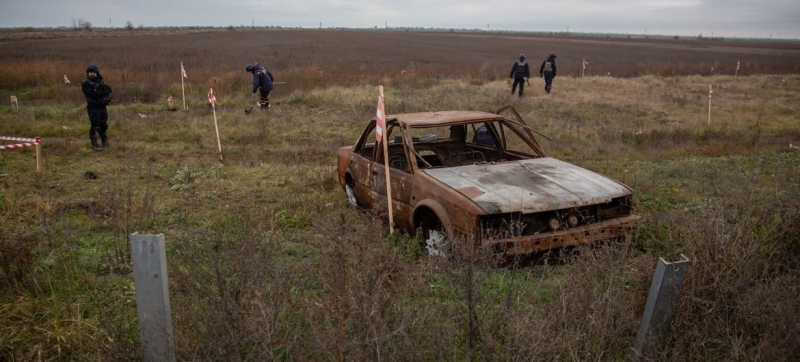
Sappers are clearing the territory previously occupied by Russia between Nikolaev and Kherson. UN report: “an atmosphere of fear” reigns in the Russian-occupied territories of Ukraine International Law
The Russian Federation has created a “stifling atmosphere of fear” in the areas of Ukraine it occupies, according to a report released Wednesday by the UN Human Rights Office. The authors of the document report that in an effort to consolidate their control over the population of these territories, the Russian authorities are committing “large-scale violations” of international law.
Actions of the Occupation Authorities
The report, based on more than 2,300 interviews with victims and witnesses, details the measures taken by the Russian Federation to impose the Russian language , citizenship, laws, judicial system and educational programs in the occupied territories. At the same time, as the document states, manifestations of Ukrainian culture and identity are suppressed in these regions and the Ukrainian system of governance is dismantled.
“The Russian Federation’s actions have torn apart the social fabric of communities and left individuals isolated, with profound and long-lasting consequences for Ukrainian society as a whole,” said UN High Commissioner for Human Rights Volker Türk, commenting on the study’s findings.
Conditions of “general impunity”
Despite the fact that the Russian Federation began the occupation of Ukrainian territory from Crimea in 2014 year, the report focuses on the situation on the territory of Ukraine, which fell under Russian occupation after a full-scale armed attack launched by the Russian Federation on February 24, 2022.
The actions of the Russian Federation have torn the social fabric of communities and left individuals isolated
From the outset, Russian military forces, operating with general impunity, as stated in a press release from the UN Human Rights Office, have committed widespread abuses, including arbitrary detention of civilians, often accompanied by torture and ill-treatment. There have also been cases of enforced disappearance. Initially, Russian military forces persecuted individuals they considered posed a security threat, but over time this repression expanded to include anyone they considered opposed to the occupation.
Russian troops, the report noted, also used force to suppress peaceful protests, restricted freedom of expression, imposed strict controls on the movement of residents and looted homes and businesses.
Control over sources of information, encouragement of denunciation
The occupation authorities shut down the Ukrainian Internet and mobile networks, television and radio channels, and all digital traffic was redirected through Russian networks, which allowed control of information available on the Internet and prevented the population from freely receiving information from independent news sources, relatives or friends. People were encouraged to inform on each other, causing them to fear even their friends and neighbors.
The report notes that certain Russian actions aimed at suppressing expressions of Ukrainian identity affected, in in particular, children. The Russian Federation replaced the Ukrainian curriculum with the Russian one in many schools and introduced textbooks with narratives designed to justify an armed attack on Ukraine. She also recruits children into youth groups to instill in them “Russian patriotism.”
Russian Federation passports
People in the occupied territories are being pressured into obtaining Russian passports, the report says. Those who refused were subject to criticism from the occupation authorities and restrictions on their freedom of movement. They were gradually denied employment in the public sector, as well as access to health care and social security.
The situation after de-occupation
The report also describes in detail the situation in the areas returned by the Ukrainian army at the end of 2022, including Nikolaev and parts of the Kharkov and Kherson regions, to which the UN Human Rights Office subsequently had access.
“The invasion, occupation and subsequent takeover of these areas by Ukraine left behind damaged homes and infrastructure, land contaminated with mines and explosive remnants of war (ERW), plundered resources, destroyed local economy and a traumatized, distrustful community,” the report says.
“Twice Affected”
It notes that the Ukrainian government is faced with the challenge of resuming services in these areas. In addition, Ukrainian authorities have had to contend with the consequences of violations of international humanitarian and human rights law during the occupation, including through a wide range of war crimes investigations.
Some people became victims twice – first during the Russian occupation, and then again when they were persecuted for collaboration
The report raises concerns about the vague language of Ukraine’s Criminal Code, which results in people being prosecuted on charges of collaborating with occupying authorities for actions they were lawfully undertaking under international humanitarian law, such as working to provide essential services . Prosecutions were also carried out against persons who collaborated with the occupation authorities under duress.
“Such persecution has tragically resulted in some people being victimized twice—first during the Russian occupation, and then again when they are persecuted for collaboration. This risk of potential prosecution has spread fear among those who lived or are still living under occupation and is increasing divisions,” the High Commissioner warned, calling on Ukraine to reconsider its approach.
Call to stop the war
The High Commissioner once again called on the Russian Federation to immediately stop the armed attack on Ukraine and withdraw to internationally recognized borders in accordance with relevant UN General Assembly resolutions and international law.
“Given the scale and depth of the violations suffered by those under occupation, a comprehensive approach to accountability [for these violations] is needed, including both criminal justice, as well as broader measures that promote truth and reparations,” Turk said.
“The international community must support Ukraine in all these aspects,” he added.
